An American in Milano
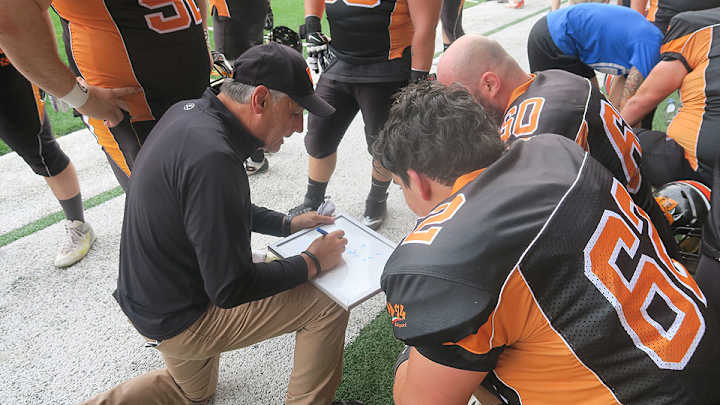
MILAN, Italy — The Velodromo Vigorelli is a place of legend in this city. For decades, it was an important speed cycling track, home to the record for the longest distance cycled in one hour. The Beatles played their first show in Italy here in 1965, and a few years later a Led Zeppelin concert at this site infamously devolved into a tear gas-cloaked riot.
On the third Sunday in June it’s home to a different kind of drama. It's far less attended, but every bit as passionate. This is the essence of American football in Italy.
The Milano Rhinos, one of the original American football teams in Italy, have fallen one minute and 34 seconds short of the Italian Super Bowl. As the clock turns to zeroes in a 24-20 loss to the crosstown-rival Milano Seamen, one player spikes a can of Red Bull onto the turf and bellows. A young running back—who did not even get into the game—flops backward onto the velodrome’s wooden track and covers his face mask with his hands. A model-slash-defensive back, who missed several weeks of the season to film Zoolander 2, is wearing under his pads a sleeveless t-shirt that reads, “I Am Okay.” But he’s clearly not. He’s sobbing.
This is a brand of football that Joe Bommarito, the man best described as the Rhinos’ American football consigliere, didn’t even know existed nine months ago. He’d spent 12 years immersed in the game from the perspective of a road-wearied NFL area scout for the New York Jets, driving as many as 250 miles a night across the wide-open west to prepare reports that may or may not matter when draft day rolls around.
Everything is different here. Each word Bommarito speaks is received with the hushed seriousness of a gospel verse at Catholic Mass. All but the two American players on the roster quite literally play for pizza (or sweets from the bakery that is owned by a player’s wife), though their post-game despair reveals they’re actually playing for much more. Bommarito came to Italy to coach, but his job became more like that of Bill Parcells in Miami or Mike Holmgren in Cleveland, tasked with making over a team—and he took that team farther than it had gone in 21 years.
Barely 12 hours after the loss, the Rhinos offensive lineman nicknamed “Kong” texted Bommarito. At age 39, Kong's body can scarcely handle four quarters of a football game. But he is already thinking about playing another year. For the Super Bowl.
Thanks a lot for your confidence immediately yesterday, he texted. I hope you come back next year. I’m not sure to retire. Luca “Kong” Chirico.
* * *
Joe Bommarito spent much of his time coaching technique to the offensive lineman. (Jenny Vrentas/The MMQB)

Bommarito never pictured coaching in Italy. Then again, 15 years ago, he’d never thought about scouting in the NFL, either. He played linebacker for Monterey Peninsula College and Fresno State, then spent the next 20 years raising five kids and coaching almost every spot at Monterey Peninsula: linebackers coach, defensive coordinator, offensive line coach, assistant head coach, head coach. He became friends with Herm Edwards, who played at Monterey Peninsula two years before Bommarito, and for 15 years ran Edwards’ youth camps.
He’d never asked Edwards about breaking into the NFL, but in 2001, his friend called: The Jets had just hired him to be their head coach, and he was on a plane to New York. “You’re coming with me,” Edwards told Bommarito. The Jets had an opening in their scouting department, and the plan was for Bommarito to start small, getting his feet wet with a block of schools in the west. That changed when Trent Baalke, then the Jets’ west-coast scout, took a job with Washington. Bommarito was suddenly in charge of about 50 schools.
He knew the job would be a grind, but he loved it, staying on through two Jets general managers and three head coaches. In 2008, he read aloud a scouting report on San Jose State cornerback Dwight Lowery with such gusto that Eric Mangini, the coach who succeeded Edwards, told him, “Joe, I think I’ll have you read my eulogy when I die.” (The Jets drafted Lowery in the fourth round, and for three seasons, he displayed the instincts for the ball promised in Bommarito’s report).
But in 2013, Bommarito’s contract was up, and the Jets hired a new general manager. John Idzik made changes to the scouting department, and replaced Bommarito. “You give them 12 years of your life, and be loyal, and they kind of kick you to the curb, at least this guy did,” Bommarito says. “But I understood it. I told him, you’re the GM, and it’s your decision, and I respect whatever you decide to do. If you don’t want me here anymore, that’s fine. And that’s the way it went.” (The new west-coast scout Idzik picked to replace Bommarito only lasted a year).
Bommarito realized the players (and coaches) going missing at halftime were on a cigarette break. He gave a lecture on how smoking hurts performance; it was the first time many had been told that.
Age 56 at the time, Bommarito wasn’t sure what to do next. That’s when his wife, Cyndi, came up with the idea of coaching in Europe. One of his former players at Monterey Peninsula had recently coached in Naples for two years, and reported back thusly: If I died and went to heaven, it would probably be like this. Bommarito was reluctant at first, but he posted his résumé on a website called Euro Players, the Monster.com for American football jobs around the world. Offers came in from France, Germany, Australia, Egypt and Italy. Bommarito is Sicilian by heritage, and he and Cyndi had always wanted to visit Italy. By now, their kids were grown. Edwards encouraged him to go for it.
Bommarito would work with all six of the club's teams, from the under-9 kids playing flag football after school to the semi-pro team that competes in Italy's top division. The Rhinos had only made the Italian Football League playoffs once in the past eight years, and hadn’t played in the Italian Super Bowl since 1994. An American, with NFL experience, seemed to be just the guy to get the once-proud team back on track.
Bommarito flew to Milan in late September 2014. A few weeks later, he got a taste of exactly for what he’d signed up. The Under-19 squad was playing a team called the Daemons in the outskirts of Milan. Bommarito arrived at the field and couldn’t find the Under-19 coach, Marco Paganucci, a big-bellied man with a voice loud enough to reach the Italian countryside. Marco’s coaching habits include wearing a full-sized play sheet—8.5 x 11 inches—on a lanyard around his neck.
“Where’s Marco?” Bommarito asked.
“Marco is really nervous right now,” another coach told him.
“OK, so where is he?”
The coach pointed at the snack bar, which in Italy—even for youth games—is fully stocked with alcohol. Marco was standing there, cigarette in one hand, knocking back a few drinks before kickoff. Bommarito walked over to him.
“Coach, I’m so nervous,” Marco said. “I think I’m going to have a heart attack.”
* * *
An American in Milano
Rhinos players gather to buy team merchandise before the game. (Jenny Vrentas/The MMQB)
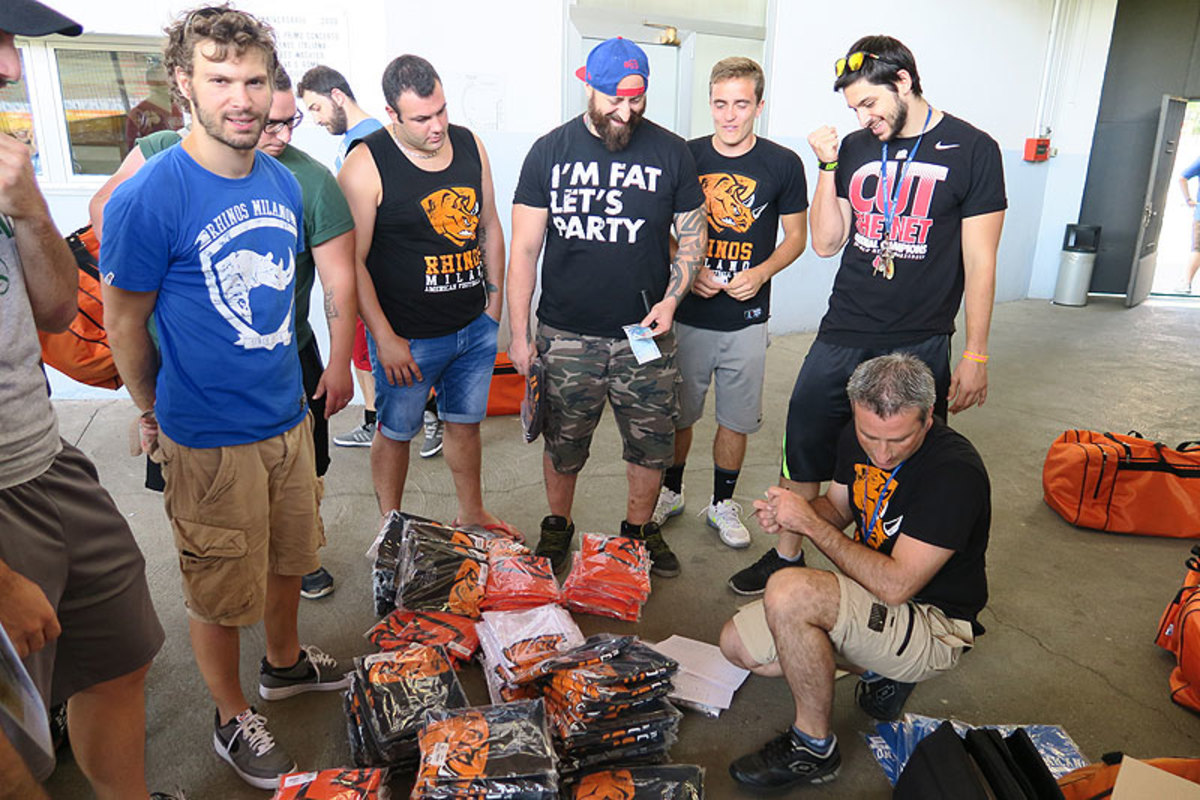
A sign in the Rhinos locker room. (Jenny Vrentas/The MMQB)
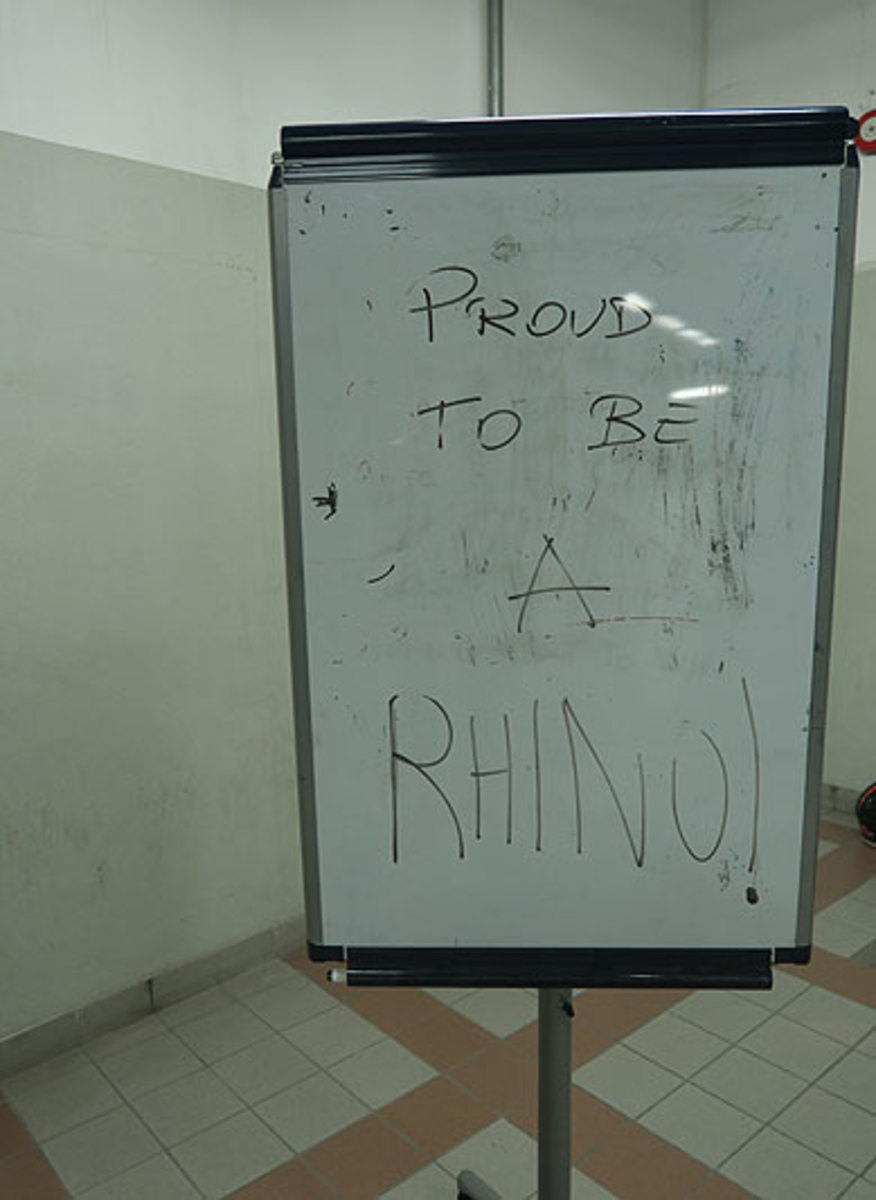
Marco Paganucci is the Rhinos' under-19 coach and also coaches special teams for the senior team. (Jenny Vrentas/The MMQB)
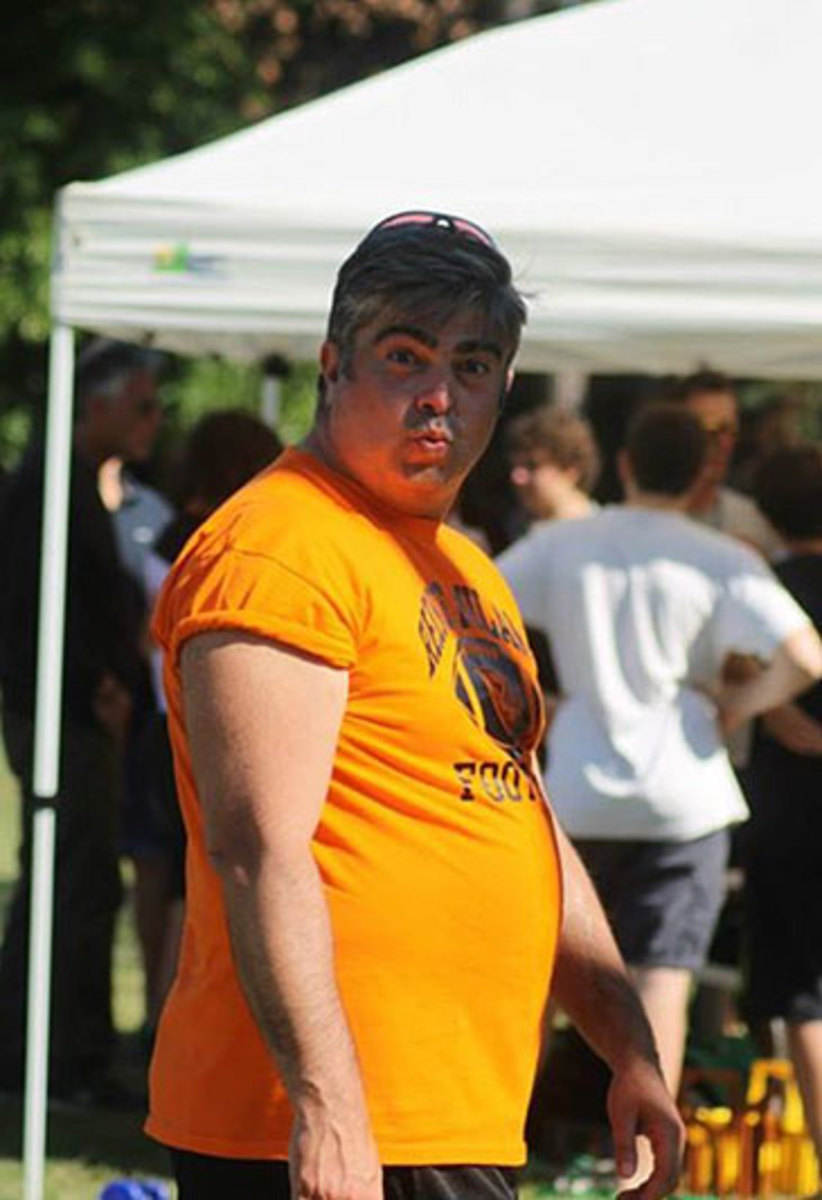
The helmets for Parker Orms (13) and T.J. Pryor (10) are adorned with a large white "A" to denote their status as Americans. (Jenny Vrentas/The MMQB)
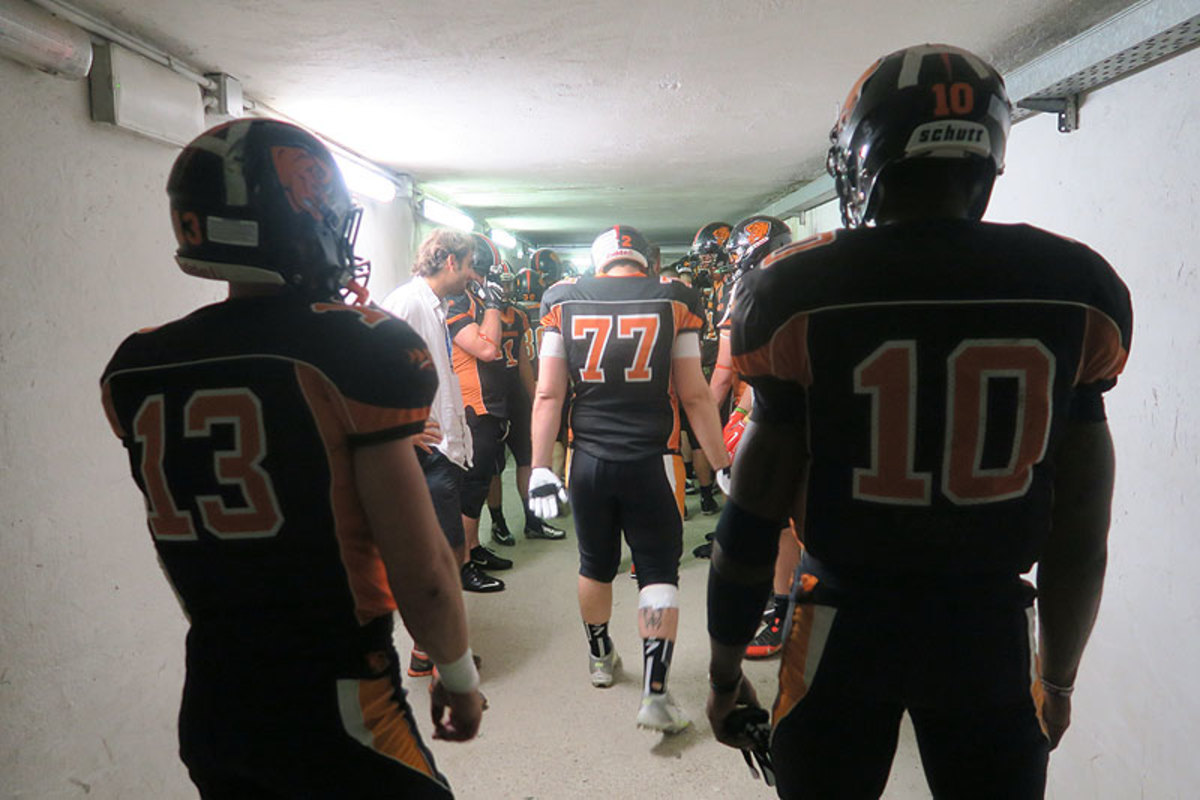
Coach Bommarito (center) huddles with the offensive linemen before the game against the Seamen. (Jenny Vrentas/The MMQB)
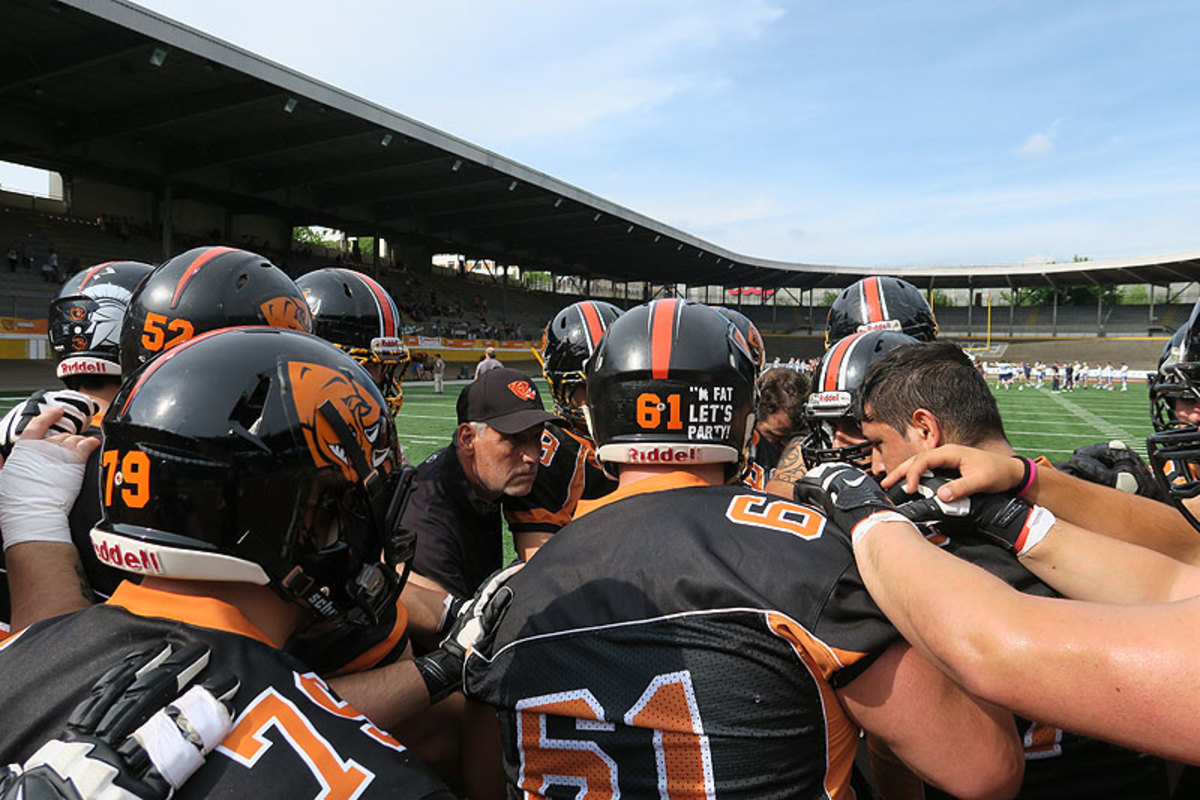
The Rhinos stand at attention during the playing of the Italian national anthem. (Jenny Vrentas/The MMQB)
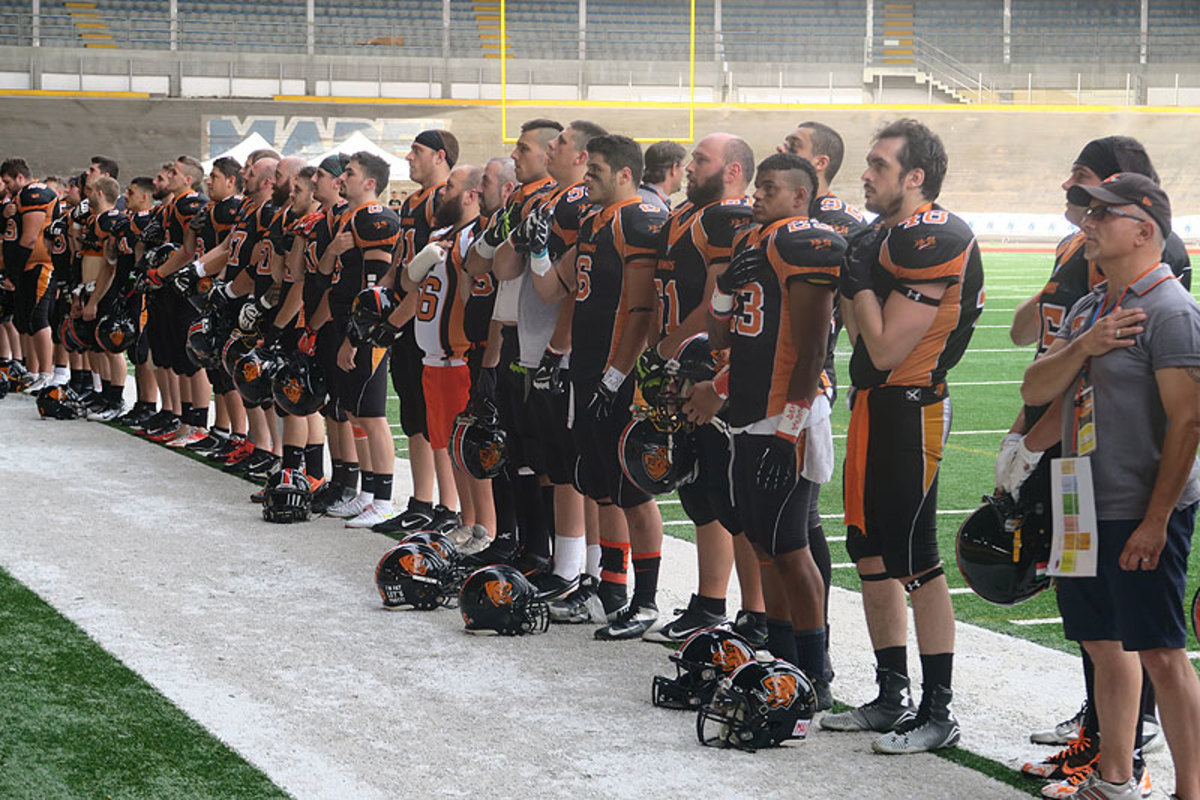
After finishing one win shy of the Italian Super Bowl, many of the Rhinos are despondent. (Jenny Vrentas/The MMQB)
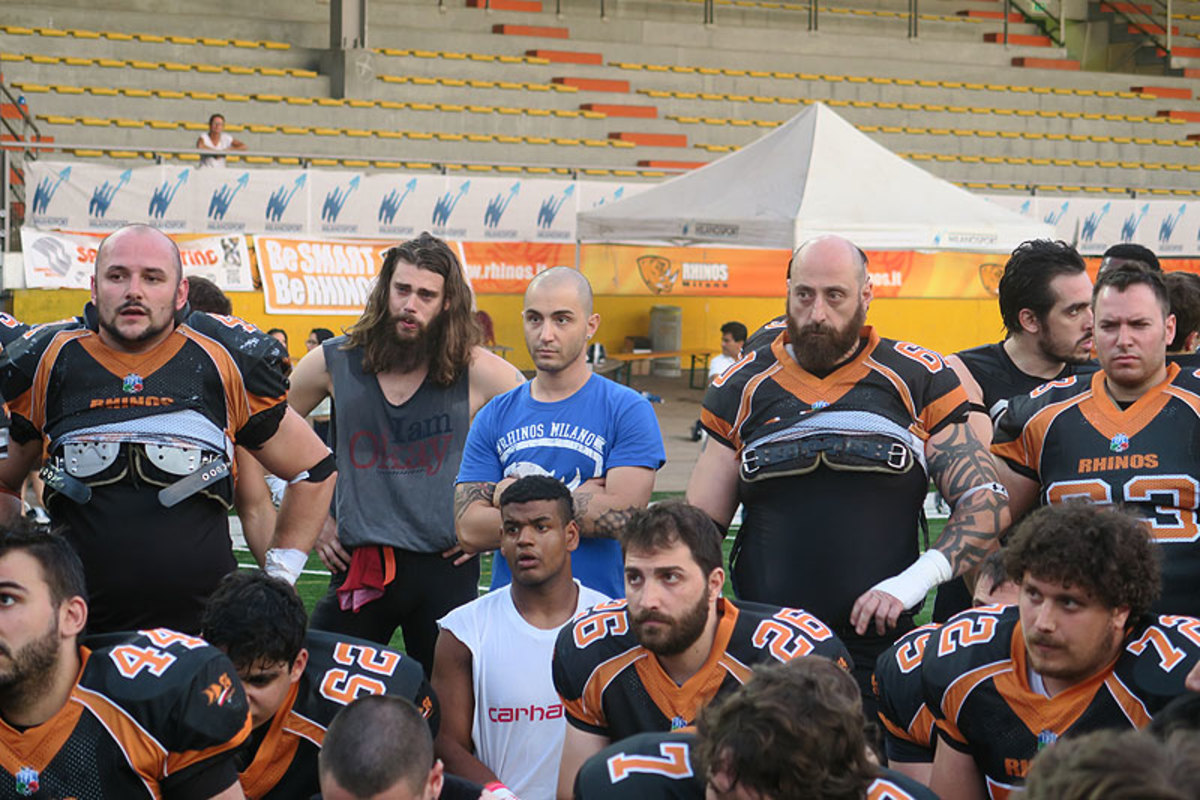
Kong, 39, has played every position but QB and safety in his 20-year playing career, but offensive line is his favorite. "I love the moment before the snap on the line of scrimmage," he says. "You're alone. You see everything about the player going against you. I go in another universe with my opponent. That’s my favorite moment of the day." (Jenny Vrentas/The MMQB)
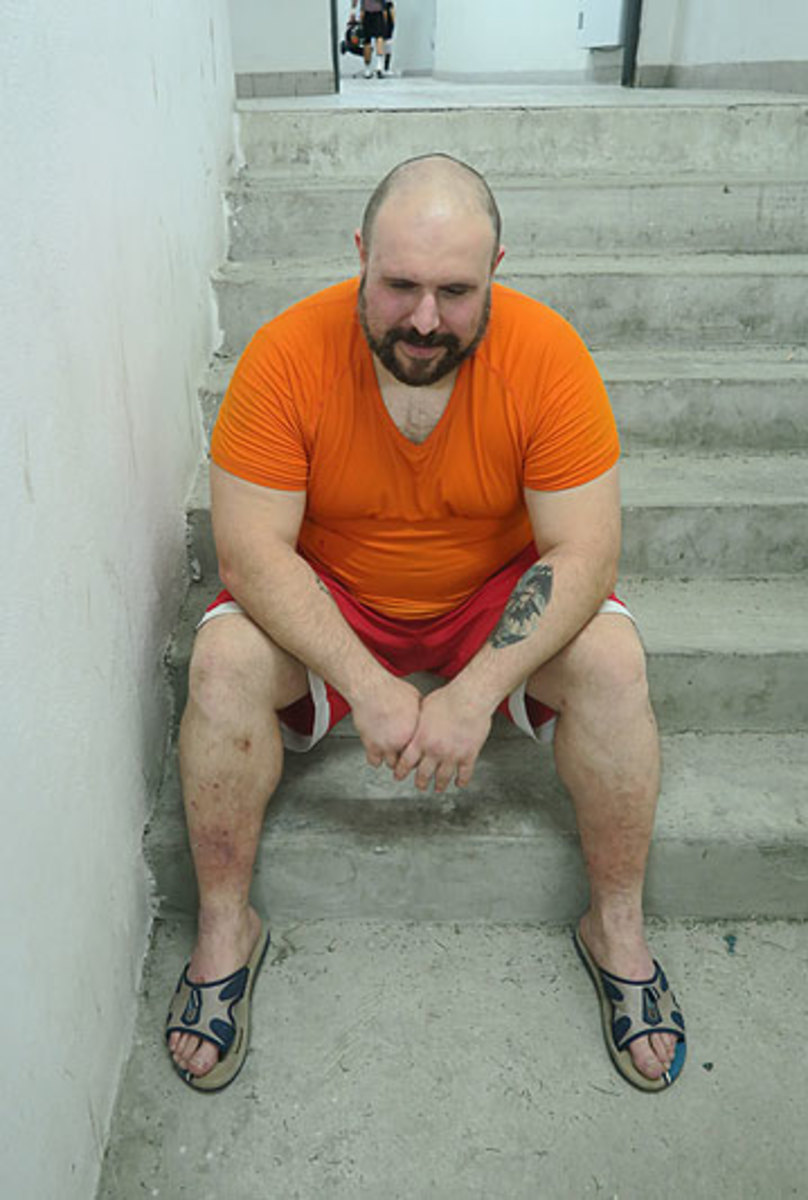
The Rhinos’ best years were the early ones. In the late 1970s, the Rhinos became one of the first American football clubs in Italy, playing early games against American soldiers on the NATO bases. Hotel magnate Gionni Colombo, whose name is now on the Italian Super Bowl trophy, put structure around the sport in Italy, creating a football federation and the first Italian championship. The Rhinos won three straight titles, from 1981-83.
Popularity of the sport skyrocketed in Italy through the end of the ’80s. At its peak the Italian Super Bowl drew some 25,000 spectators. But the growth proved to be emotional, and not sustainable. The federation was mismanaged at the top. Teams were closing. There was no effort to grow the youth game.
“To grow so fast was the biggest mistake of the league,” says Marco Mutti, team president of the Rhinos’ opponent, the Milano Seamen, who were once owned by fashion designer Giorgio Armani. “With the philosophy of our nation, it’s better to keep everyone happy and play not for money, but for pizza.”
The MMQB: Europe Week
With football in America in the middle of summer vacation, The MMQB heads overseas for a week of stories on the growth of the game outside the country. Jenny Vrentas: The Eurobowl Faszination in Germany FULL STORY Andrew Brandt: Looking back at the NFL’s previous international forays FULL STORY


Next to Mutti on the Seamen’s sideline during warmups is someone who personifies the passion for the sport that exists here, even without the money: Luca Bellora, a defensive tackle who once played for the Barcelona Dragons of the NFL’s World League. He’s 50 now, still chasing the sport, even though the Italian Football League has an age limit of 48. Since he can no longer play here, he joined a team in Brazil this past winter. He returned to Italy only after he tore his Achilles tendon.
The playing for pizza model is how the Italian game works today. The Rhinos run on a yearly budget of about 130,000 euros, less than 150,000 U.S. dollars. Use of the velodrome costs 40,000 euros. The rest of the budget goes quickly, on team travel, insurance, trainers and salaries for the three Americans—Bommarito, quarterback T.J. Pryor and safety Parker Orms. “We almost break even,” says team president Alessio D’Ascenzo, a 36-year-old Brussels-based businessman who used to play running back for the Rhinos. “But you don’t count money when it comes to a passion.”
There aren’t a lot of sponsors available in a soccer-driven country, but one is a conveyor belt company owned by a former player. The club also sells some merchandise—largely to its own players. A few hours before the big semifinal game, several starters were lining up to fork over euros for stacks of Rhinos t-shirts. The truth is, members of the Rhinos’ 20-person board contribute out of their own pockets to make the team go. The one-bedroom apartment the Rhinos offered rent-free to the Bommaritos, on a café-lined street not far from the Duomo, is owned by D’Ascenzo.
The only return on investment they want is wins. That’s what the Rhinos asked from Bommarito. He didn’t have to look hard to start making changes.
After watching the Rhinos’ spindly Under-19 team get whipped by the buff Seamen, Bommarito discovered the Rhinos didn’t have a weight program. They purchased 3,000 euros of weight equipment and invested in a part-time strength coach. Bommarito also introduced the Bear front from Buddy Ryan’s 46 defense, which he learned from Rex Ryan, to try to help a struggling defensive line. A few weeks after he arrived, Bommarito realized that the players (and coaches) going missing at halftime were out on a cigarette break. He gave a lecture on how smoking can hamper athletic performance; it was the first time many had been told that. Another foreign concept he introduced: practicing for two hours, without breaks.
Bommarito’s biggest endeavor was the Rhinos’ offensive line. It was a mess. The center was a player called Nutella, like the hazelnut spread. No one ever specified if that was a nickname or not, but the bigger issue was that Nutella kept forgetting the snap count. Bommarito replaced him with a 31-year-old news producer named Matteo Piccoli, who had his heart set on playing tight end, but even more so on getting on the field. For his left tackle, Bommarito noticed that a player on the Under-16 team, Samir El Negro, had remarkably quick feet. El Negro had been playing soccer until last year, but after getting teased because he was bigger than the other players, he decided to give football a try. In his first game with the Rhinos' top team, he played so well, his teammates gave him an ovation from the sideline.
Technique, Bommarito quickly learned, is a bit of a moving target. The main problem along the line was the players standing up too tall. They'd lose their leverage and get bull-rushed. So he came up with a teaching tool.
“Imagine I have a piece of fishing line,” he told the players. One end would be tied to their face masks. The other end would be tied to, ahem, a very sensitive part of their lower bodies. He wanted them to envision the very painful yank that would occur if they stood up too high. Yuri, the lineman who usually asks El Negro to translate from English to Italian for him, needed no translation here. Anytime Bommarito mentioned the fishing line, Yuri’s eyes would get big. Si, coach! Si!
* * *
Rhinos center Matteo Piccoli tapes a handwritten note to his helmet before each game. (Jenny Vrentas/The MMQB)

Getting up for games is one area where the Rhinos didn’t need any help. One player has a habit of carrying around a boombox blasting John Denver’s “Rocky Mountain High.” Piccoli, the center who replaced Nutella, tapes a handwritten quote to the back of his helmet. Usually, the quote is in Italian, but in deference to Bommarito, he wrote in English for this game.
“It is enough. This is the right place. Drive on.” (Brigham Young)
Head coach Alessandro Trabattoni, a receiver on those three Rhinos Super Bowl teams in the ’80s, makes an impassioned march around the locker room before kickoff. None of the Americans could understand his pregame speech, but no translation is needed for chest-beating.
The Rhinos get off to a tough start. Pryor, the gangly passer from Eastern Kentucky, leads the team downfield on its first drive, but fumbles while trying to run across the goal line. The Seamen strike back quickly, burning the defense on a 60-yard touchdown pass. But this Rhinos team has more confidence than it’s had in recent years. A few weeks ago, the Rhinos beat the Seamen here on their shared home field to avenge an early-season loss. (The players partied until 5 a.m. the next day).
The field is the same size as in the U.S. (though that's not the case everywhere in Italy), and the rules are borrowed from NCAA football, but the strategy here is something different. For instance, when the Rhinos have a fourth-and-7 from the Seamen’s 22-yard line, they don’t kick the field goal. They go for prima down, and get it. “All the best kickers in Italy,” explains a bystander on the sideline, “play soccer.” Three plays later Pryor scores on a 3-yard touchdown run. The voice of the stadium announcer booms, “Trrrrrrrrre yards!”
Managing a game can be challenging on a field where the scoreboard is hard to read at dusk, and where there is no play clock. Yet, there are delay of game penalties. One of the officials is supposed to yell out, “10 seconds!” as a warning. Pryor, who doesn’t hear any such command, is slapped with a penalty. But things are looking up for the Rhinos in the third quarter when Orms, the American safety who was on his way to interview for an insurance job when Bommarito called last fall, manages to rip the football right out of the Seamen punt returner’s grasp 10 yards from the goal line.
Before the offense runs back onto the field, Piccoli gets an ice pack shoved down the back of his shoulder pads. He’s already playing with no cartilage in his knee. Now, evidently, this is his home remedy for playing through a stinger. Piccoli snaps the ball to Pryor, who finds a wide-open receiver in the end zone. The Rhinos line up for the extra point, but suddenly, D’Ascenzo, the team president, comes sprinting onto the field, waving his hands.
“Wait! Wait!”
The Rhinos only have 10 men on the field. The 11th man runs on, but the extra point bounces off the upright.
The game comes down to the final two minutes. The Rhinos, clinging to a two-point lead, have a third-and-8 at the Seamen’s 40-yard line. Pryor drops back to pass, and sees a receiver alone inside the 10-yard line. This would end the game. But the receiver can’t make it to the ball. He’s normally the team’s No. 5 receiver, but the Rhinos’ best wideout broke his collarbone last week, and their third-best receiver was away on a business trip in Geneva (American football is not a viable excuse to miss work). Not used to playing this much, the player cramps and collapses to the turf. The Seamen will get the ball back with 1:34 on the clock. It’s just enough time.
The Rhinos have another chance to end the game, on a Seamen’s trick play gone bad, but the defensive back in closest position to make an interception slips before he can get to the ball. Seamen quarterback Jonathan Dally, who delivered his team a Super Bowl victory last year, scampers outside the pocket to make plays, as he’s been doing all day. He runs in for the winning touchdown with 22 seconds left. The Rhinos are stunned.
* * *
After the game, the Rhinos and Seamen joined together for a group picture. (Mara Telandro/Milan Rhinos)

As intense as the rivalry is between these teams, there’s an underlying camaraderie among American football players in Italy. Between downs late in the game, the Rhinos right guard was helping to stretch the hamstring of the Seamen nose tackle. After the game finishes, the Rhinos make three salutes in Italian: for their opponent, for the 2,000 fans at the velodrome and for themselves. Then something happens that you’d never see in the United States. The two teams, the Rhinos and the Seamen, drape their arms around each other and take a photograph together.
But the sting of missing the Super Bowl permeates the air. “It’s burning inside,” wails Kevin Khay, a 21-year-old outside linebacker who dreams of playing the sport in America. “We played very well, but I want a Super Bowl. I’m sorry, but I want a Super Bowl.”
When the Rhinos gather together on the velodrome field, the defensive back who slipped on the last drive throws himself in front of the team frantically. He’s speaking in Italian, but a teammate translates: This is on me. I’m going to work from tomorrow to be better. His apology is met by a chorus of protests from his teammates. No! No! No!
Bommarito steps in front of the players, too. He speaks slowly, and calmly.
“You fought to the end,” he says. “It didn’t just happen. Your hearts, and how big they are, was the reason we got here. Hold your heads high, and be proud. Because you are Rhinos.”
It’s the nature of football in Italy that you can’t count on anything for next season. Bommarito, like both American players, signed a one-year deal. His only plans are immediate ones: Fly back this week to Monterey, Calif., where he and his wife will live on their boat. Later this month they’re expecting a visit from El Negro, the 17-year-old offensive tackle, who wants to take a tour of community colleges, with the hopes of playing football in the U.S.
Two weeks later at the velodrome, on July 4, the Seamen won the Italian Super Bowl against the Parma Panthers. That dream felt far away for the Rhinos, but it also never felt closer. An NFL scout rediscovered football in Italy, and the Milano Rhinos rediscovered their confidence.
Before leaving the velodrome the night of the semifinal, someone updated the whiteboard that sits at the entrance to the Rhinos locker room. The message was fresh in their minds: “Proud to be a Rhino!”
Follow The MMQB on Facebook, Twitter and Instagram.
[widget widget_name="SI Newsletter Widget”]

